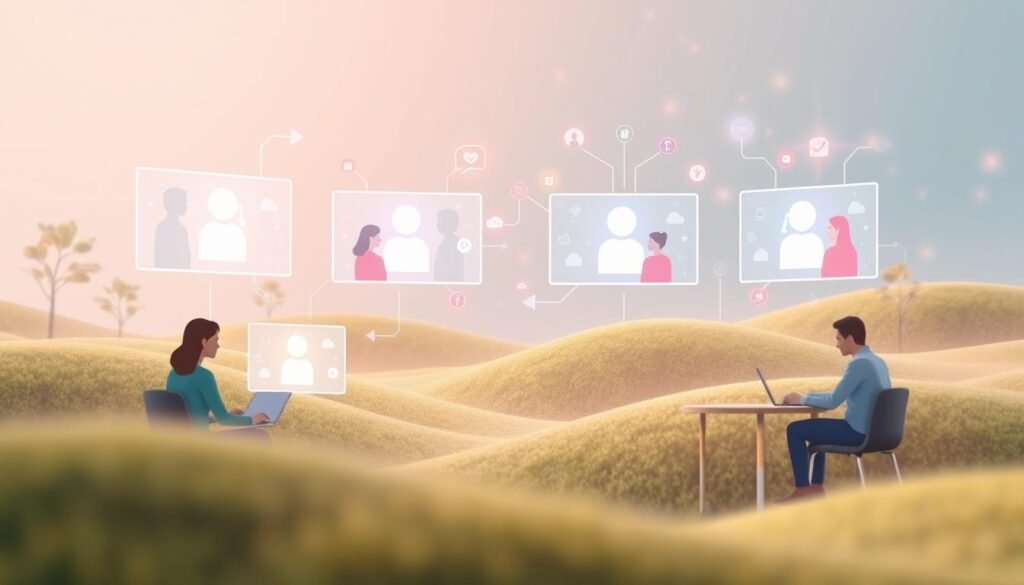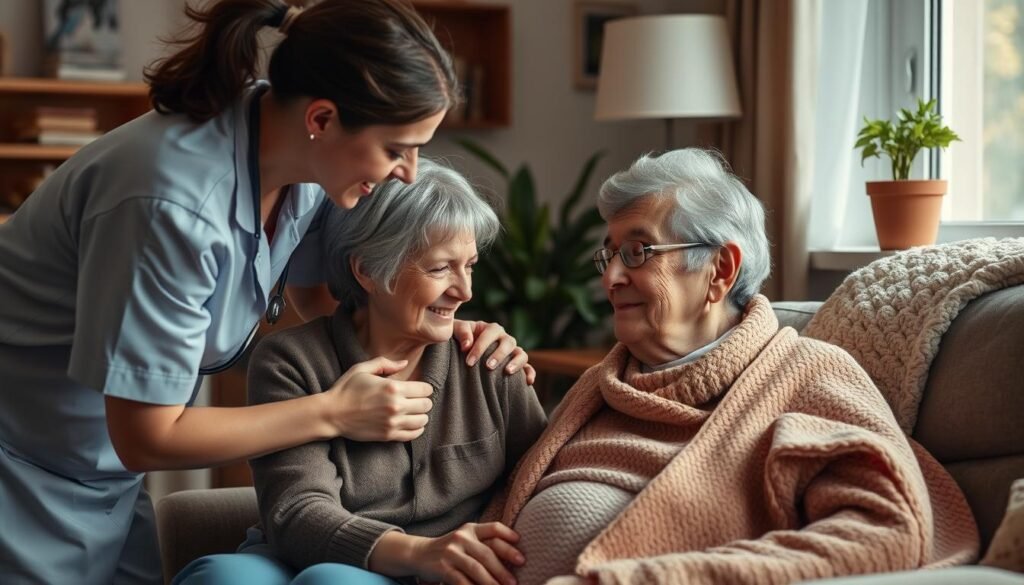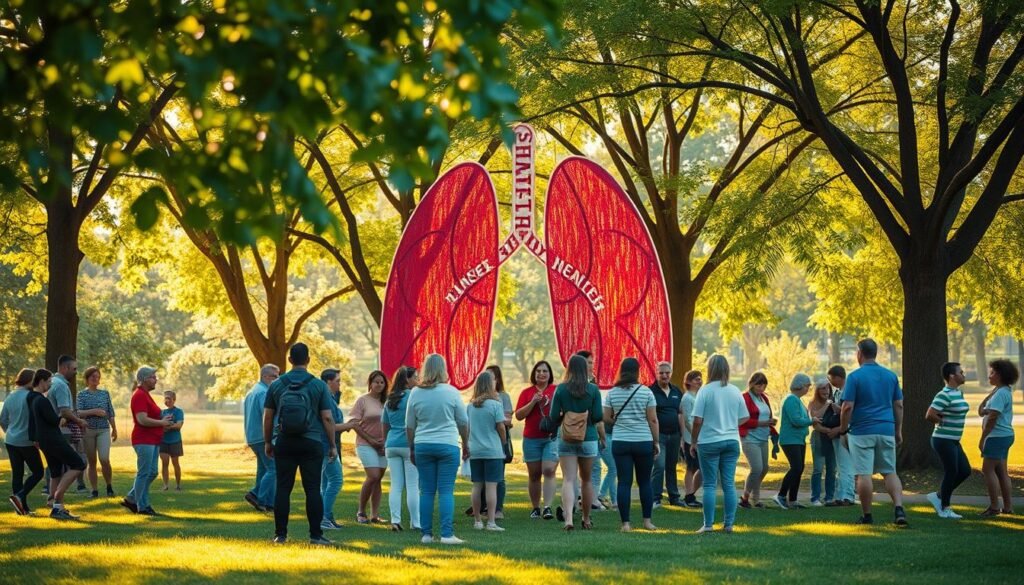Every year, about 239,000 people in the United States are told they have non-small cell lung cancer (NSCLC). This number shows the big challenge NSCLC patients and their families face. Finding help can be hard, but there are special support groups for this. These support groups are vital. They offer lung cancer community resources, emotional support, learning materials, and hands-on help to those dealing with this tough diagnosis.
Being part of a support group makes people feel they’re not alone in their fight against lung cancer. These groups also play a big role in lung cancer patient education. They give information on treatment options and have talks by cancer experts. This empowers patients and caregivers to tackle cancer more actively. Together, they find better ways to cope with the challenges of non-small cell lung cancer.
Key Takeaways
- 239,000 annual NSCLC diagnoses emphasize the need for support.
- Support groups provide essential emotional and educational resources.
- Collaboration fosters understanding among patients and caregivers.
- Expert-led workshops offer updated information on cancer care.
- Connecting with others can significantly reduce feelings of isolation.
Understanding Non-Small Cell Lung Cancer
Non-small cell lung cancer (NSCLC) is the most common type of lung cancer. It makes up about 80 to 85 percent of all lung cancer cases. This group includes a few different types, mainly adenocarcinoma, squamous cell carcinoma, and large cell carcinoma. Each type has its own features and affects how doctors treat the cancer.
Adenocarcinoma is the kind you’ll find most often. It occurs in smokers and non-smokers. It’s usually found in the outer parts of the lungs, which helps doctors find it early. Squamous cell carcinoma is more likely if someone has smoked. It grows near the middle of the lungs. Large cell carcinoma can grow and spread fast, making it hard to catch early.
Knowing lung cancer stats can help patients understand their situation better. For NSCLC, the 5-year survival rate is about 26%. That’s a lot higher than the 7% for small cell lung cancer. These facts help patients choose their treatment wisely.
There are many resources out there to help with NSCLC. You can find downloadable PDFs and videos that explain NSCLC stages, causes, and treatments. The American Cancer Society offers tools to help people understand their cancer better. They can help manage what comes next in the cancer journey.
The Importance of Support Groups for Lung Cancer Patients
Lung cancer impacts many people around the world. This makes finding good ways to cope very important. In 2018, over 2 million new cases were reported. Many people with lung cancer go through hard times. Support groups help a lot by giving a safe space to share feelings and face challenges without being judged.
Joining a lung cancer support group offers much emotional support. It also provides insights on dealing with the disease’s complexities. Studies show that having social support improves life quality for lung cancer patients. They feel less alone, more psychologically healthy, and part of a community.
Support groups are there for those in treatment, who’ve finished treatment, and their families too. Medical experts often lead these groups. They talk about treatment choices, how to breathe better, and talking well with doctors. This setup lets people share lung cancer coping strategies. It helps them learn from others and find hope in shared stories.
In big cities, support groups balance out the lack of social support. Members feel a sense of warmth and connection. These meetings are both inviting and helpful. Groups are run by organizations like the American Cancer Society and Lung Cancer Alliance. They ensure patients find a community that gets what they’re going through.
The existence of lung cancer support groups boosts emotional health. It also helps with coping in tough times. Looking for the right group helps people customize their support. This ensures they get the emotional help they need throughout their cancer fight.
Finding Non Small Cell Lung Cancer Support Groups
Finding support for non-small cell lung cancer helps patients and families face treatment challenges. They can look at hospitals, websites, and groups that help cancer patients. Healthcare teams often know about local support for lung cancer patients.
CancerCare offers many resources for lung cancer patients. They have free groups for those dealing with lung cancer. They also run the LUNGevity Lung Cancer Helpline at 844-360-LUNG (5864). Here, patients find professional help covering emotional support and patient rights.
CancerCare gives workshops like the Coping Circle Workshops for lung cancer topics. They provide these in English and Spanish. They also have Magnolia Meals at Home to help with meals during treatment.
Using resources from trusted groups can make a big difference. These resources help build connections and give guidance when it’s needed most. Hearing stories from others facing cancer can also inspire and bring people together.
| Resource | Description | Contact Information |
|---|---|---|
| CancerCare | Offers free support groups and financial assistance for eligible families. | 844-360-LUNG (5864) |
| LUNGevity Foundation | Connects patients with resources and community support focused on lung cancer. | Visit their website for more information. |
| Magnolia Meals at Home | Provides meal delivery services to specific areas for patients undergoing treatment. | Check local availability for services. |
| Coping Circle Workshops | Workshops addressing various coping strategies, available in English and Spanish. | Contact CancerCare for schedule details. |
Online Support Communities for Lung Cancer
Online communities are crucial for those facing lung cancer. They offer a space to find others who truly understand. Websites like the American Cancer Society provide online lung cancer forums. Here, users can discuss, find chat rooms, and send private messages. This creates a supportive environment for sharing advice, emotional backing, and lung cancer patient education.
Virtual support greatly improves life quality for lung cancer patients. The National Cancer Information Center offers help round the clock. It’s available through phone, live chat, or video. People can share their worries and find solace in others’ stories, building a sense of community.
Programs like ACS CARES™ deliver customized help to those affected. They give vital information tailored for each patient and caregiver. CaringBridge is a free tool that lets patients update friends and family easily, reducing stress.
Being part of these online groups also helps with gaining vital knowledge. They learn from valuable lung cancer patient education pieces. By exchanging information and experiences, they can better understand treatments, manage side effects, and make lifestyle changes together.

Local Non Small Cell Lung Cancer Support Groups Near You
Local support groups help lung cancer patients and their families tremendously. Many hospitals and clinics have special groups. Joining these groups lets people meet healthcare experts, share stories, and get support.
Connecting with Others at Hospitals and Clinics
Hospital support networks are key for lung cancer patients. They cover emotional and practical needs. The American Lung Association and CancerCare offer meetings. Here, people can share experiences and feel less alone.
Community Centers and Local Organizations
Community centers put on health events. These events help lung cancer patients meet others. Groups like the American Cancer Society and LUNGevity raise awareness. They provide resources for navigating cancer. For more on support services, visit this resource.
The Role of Caregivers in Lung Cancer Support
Lung cancer caregivers are vital. They help with emotional and logistical challenges. This includes managing appointments, medications, and transport to treatments. Their role is crucial in navigating healthcare systems.
This understanding brings the community together. It shows why we need strong support for caregivers. Organizations focused on lung cancer education offer helpful materials for them.
Resources for Lung Cancer Caregivers
Caregivers for lung cancer patients greatly benefit from the right resources. These resources aim to improve their well-being. Let’s explore some effective support tools available for caregivers:
| Resource Type | Description | Examples |
|---|---|---|
| Support Groups | Facilitate emotional connection and sharing among caregivers. | In-person meetings, online forums |
| Educational Workshops | Offer information on lung cancer and caregiving techniques. | Cancer Support Community, LUNGevity Foundation events |
| Palliative Care Resources | Assist in managing symptoms and emotional struggles. | GO2 Foundation for Lung Cancer resources |
| Social Networks | Enable interaction with other caregivers for shared experiences. | Faith-based groups, social clubs |
| Counseling Services | Provide professional support to cope with the emotional toll of caregiving. | Individual therapy, support group counseling |
Using these resources builds resilience in caregivers. It helps them provide the best support. By engaging with these tools, caregivers balance their duties and their emotional health.

Lung Cancer Survivor Networks
Lung cancer survivor networks are vital. They provide support and education for those affected. These networks help lung cancer patients connect with survivors. This fosters a community that is both encouraging and empowering. Participants share experiences and practical tips in these lung cancer survivor groups.
It’s crucial to educate lung cancer patients well. This helps survivors understand treatment options, coping strategies, and emotional well-being better. Networks offer peer support, which brings understanding and empathy, especially in tough times. Studies show patients in mentoring programs are more emotionally resilient. This improves their health outcomes.
Many lung cancer patients have biomarker testing. This identifies genetic factors that influence treatment and success. Regular screenings are also key; they’re linked to higher survival rates. This community helps improve mental health, encourages personal expression, and fosters friendships.
- Survivors’ tips help others find complementary therapies to standard treatments.
- Emotional support communities help with the journey from diagnosis to treatment.
- Programs like CanCare match patients with volunteers for personalized support, improving recovery.
The cost of treating lung cancer is a major challenge for families. Financial aid programs can help lessen this burden. As the community grows, advocating for lung cancer patient education and research funding becomes even more crucial. This is vital for better treatment success rates.
Strong connections within these networks aid in healing and combat lung cancer. Engaging with those who have similar experiences creates a strong support system. This system helps face the disease’s challenges together. For info on spotting lung cancer early, check early detection signs of lung cancer.
Advocacy Organizations Supporting Lung Cancer Awareness
Many organizations support lung cancer awareness and education. GO2 Foundation and LUNGevity play key roles in lung cancer initiatives. They raise funds for research and help communities. Their work supports lung health and aids those affected by lung cancer.
These groups help by educating people on lung cancer risks. They stress the importance of catching the disease early. Sadly, only 25% of lung cancer is found early. This makes their work in spreading information crucial.
About 40% of people might get lung nodules, which often are not harmful. Knowing this can ease worries about lung health. Organizations like LUNGevity’s Lung Cancer HELPLine offer support. They help patients and their families manage treatment.
The table below shows key lung cancer advocacy organizations:
| Organization | Focus Areas | Contact Information |
|---|---|---|
| GO2 Foundation | Lung cancer awareness, patient support, research funding | www.go2foundation.org |
| LUNGevity | Education, advocacy, caregiver resources | www.lungevity.org |
| American Lung Association | Research, policy change, public health initiatives | www.lung.org |
With their combined efforts, these groups are changing the future of lung cancer care. They fight stigma and spread truth. This empowers and supports those facing lung cancer.

Additional Lung Cancer Community Resources
For those facing lung cancer, finding the right support is crucial. Many organizations are dedicated to offering lung cancer patient education and help. They give financial assistance, help with transportation, and provide counseling among other services.
CancerCare is known for its in-depth educational content and strong support network. It offers financial aid programs. These help reduce the medical costs of lung cancer. You can reach the Lung Cancer Support Line at (844) 835-4325 from Monday to Friday for assistance and advice.
Online tools are vital for patients and their caregivers. The American Lung Association and the GO2 Foundation for Lung Cancer provide forums and groups for support. The LCRF’s webinars connect the lung cancer community. They also offer lung cancer profile tear pads in both English and Spanish, making information more accessible.
The LUNGevity Foundation has mentorship programs. They connect survivors with those currently fighting lung cancer. Through these lung cancer community resources, people can share stories. They also build a caring and understanding network.
Many groups help with financial treatment programs, including aid for asbestos-related lung cancer cases. These programs offer detailed biomarker testing and education for healthcare professionals. Using these resources helps create a network. This network is crucial for facing lung cancer’s challenges.
Conclusion
Joining non-small cell lung cancer support groups helps both patients and caregivers. These groups provide emotional support and valuable information. They help with the challenges of lung cancer. Having support is essential, and doctors often suggest joining these groups.
Yet, these groups face some challenges. They include communication issues and logistical problems. Emotional barriers and the stigma of lung cancer also pose challenges. Despite these, a supportive environment can greatly improve life quality for those with lung cancer. It boosts their mental and overall health.
The rise in lung cancer cases highlights the need for strong support networks. By joining these networks, people can build meaningful relationships. These connections make their journey less lonely and improve community strength and health.